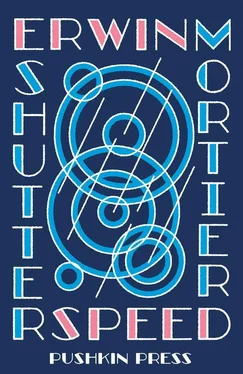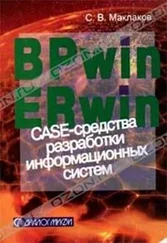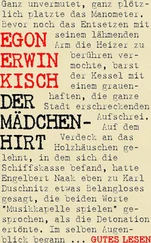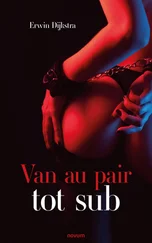The girl leaned forward again. I tried to duck my head.
‘Et maintenant,’ she said hoarsely, ‘une petite excursion aux forêts de l’équateur …’
Her right hand slid down over my shirt to my stomach, then groped under my clothes for my navel, which she fondled. Fixing me with her eyes, she wriggled her fingers under the waistband of my trousers.
‘Stop it, please,’ I squeaked.
I was even more terrified when she stirred her hand around my groin.
‘Ton petit bâtiment n’est pas très fort,’ she said. She sounded surprised.
I tried to wrench myself free, but she was gripping my shirt with her other hand. When she shifted her buttocks slightly to steady her position, I was able to work one of my hands loose from the book.
The girl wobbled precariously, her knees still pressing down on the book, while I flailed my arm. I caught hold of her hair, tightened my fist, yanked her head down as far as it would go.
Yelping with pain, she snatched her hand out of my trousers, grabbed my arm and sank her teeth into my wrist, using her other hand to claw my cheek.
I screwed up my eyes so hard that the tears beaded out at the corners. Neither of us would let go.
I don’t know how long we were locked together like that, spluttering to stifle our pain. Suddenly the pressure of her knees on my pinioned hand lifted. There was a loud crack and then a thud.
The binding of the book had split open along the spine, causing the girl to slide off the table on to the carpet amid a flurry of loose sheets.
She scrambled to her feet, looking dazed. For a moment we stood there glaring at each other, speechless, she with her hair dishevelled, me with my shirt tails out of my trousers.
Then she started screaming: ‘Tu es horrible, et toute ta famille! Your father drank himself to death! The whole world knows about it, except you, you’re a cretin …’
Knees shaking, I stuffed my shirt into my trousers, gathered up the pages from the carpet and stacked them as neatly as I could on the table. Then I put them back between the covers, to hide the damage. The girl ranted on.
‘He ruined his liver. He stank to high hell, and so do you. He’s so full of alcohol that he can’t even rot in his tomb … Ma bonne m’a dit. C’est déguelasse.’
‘Non!’ I burst out. And before I knew it I had taken a swipe at her.
She was astounded.
‘T’es maigre comme un clou,’ she scoffed.
A moment later the door opened and in came Hélène Vuylsteke. Directing her gaze from me to the girl and back again, she padded across the carpet towards us with icy calm.
Still fixing me with her eyes, but clearly addressing the girl, she said: ‘Ma chère, ne cherchez pas les oranges sous les pommiers … Go to the bathroom and comb your hair.’
The girl sauntered past Hélène out of the room.
‘Pull yourself together,’ said Hélène. She waited for me to straighten my clothes and then marched ahead of me down the stairs to the terrace, where Aunt was chatting to Miss van Vooren.
‘Were the books nice?’ she asked.
‘I had to drag him away by force,’ said Hélène, with a smile in which only I recognised the venom.
We left at about five.
‘Till next time,’ said Hélène, all smiles as she shook my hand. ‘I’ll give Isabella your regards then, shall I?’
*
‘You’re shaking,’ said Aunt as we reached the end of the alleyway.
‘I think I’m coming down with something,’ I said.
‘A summer cold, probably,’ said Miss van Vooren. ‘It’s the time of year, I expect. You want to be careful, it can turn into bronchitis …’
‘It’ll pass,’ I said.
I ran home ahead of them, down the church lane. I slipped past Uncle serving customers in the shop and shut myself up in my room for the rest of the evening.
AUGUST WAS UPON US. AT HOME NO ONE SPOKE OF MY impending departure. It was as if there were sheets hanging to dry from all the rafters, blotting every sound in the house.
‘It’s not as bad as you think,’ said Aunt, noticing my troubled look. ‘You can come over every weekend if you like. We’ve agreed on that.’
I looked at Uncle. He hunched his shoulders and gave me a soothing smile.
‘There’s not much we can do about it,’ he said, adding, ‘and even if there were, we mightn’t want to.’
He could see I was confused by his remark. He took a deep breath and glanced at Aunt, who was snipping the football forecast out of the newspaper. She always taped it to the pane in the shop door.
‘We’ll be right here,’ she said. ‘We’re not going anywhere. Where would we go, anyway? We’ll always be here. It’ll do you good, you know. More than you think.’
I tried protesting in the only way I could think of. Several days before the fifteenth of the month, the date I was to be fetched, I got the suitcase out from under my bed and put it on my table.
First I just left it there, wide open. Perhaps I hoped the accusatory sight of it would be enough to give Aunt a stab of guilt each time she went past my room.
In the next day or two I began to empty it out, trying to make up my mind what to take with me and what to leave behind. It was important to leave sufficient items behind for me to feel homesick about. There were plenty of photos that I slipped like so many banknotes between the pages of Aunt’s album, as if I were entrusting my father to a foster family. But I did set aside a handful, which I tied with an elastic band, to take with me, along with my father’s school exercise book which Uncle had given me ages ago and which I treasured because I was modelling my handwriting and my signature on his at the time.
I tipped all my mother’s letters into a drawer and left them there, because I knew Aunt would be annoyed when she found them.
There was no need to pack any clothes. ‘You’ll be needing smart outfits for that new school of yours. From now on she can buy them herself,’ Aunt said tartly. There was a sharp edge to her voice whenever she mentioned my mother which always made me feel awkward.
I tried not to count off the remaining days. In those final weeks I felt I was sleepwalking, quite devoid of any sense of volition, and that there were hands in the dead of night untying my shoelaces, grabbing my ankles, wrenching the shoes from my feet, undoing the buttons on my shirt, shaking my limp arms out of my sleeves and scattering flowers on my pillow.
Outside, August was rounding off the summer, allowing the first inklings of winter to rise from the ground as the evenings wore on. In the weeks following the annual fair the churchyard had begun to sprout wooden posts next to some of the gravestones, with notices stapled to them furnished with impressive stamps and signatures not half as neat as my father’s, and puzzling phrases like ‘legislation enforceable under section such and such’ and ‘in compliance with regulations governing groundwater levels’, as if the dead were in danger of drowning down there, and these were distress signals in their hour of peril.
Someone had marked several of the graves, including my father’s, with a bright red dot. I didn’t dare take a closer look. I was afraid I would get all emotional and start kicking the side of the bluestone slab or hammering my fists on that inane grin curving his lips in the oval portrait screwed above his name.
I managed to keep my mouth shut for about five days. Then one evening, when Aunt resolutely ignored my long face, I finally burst out with: ‘I know.’
They both stopped eating. ‘What do you know?’ Uncle asked.
‘I just know, that’s all,’ I replied.
Aunt put down her spoon, pushed back her chair and clapped her hands on her thighs. She looked at Uncle. He looked back.
Читать дальше












